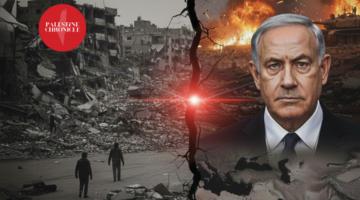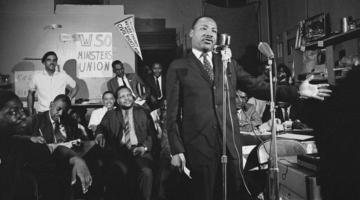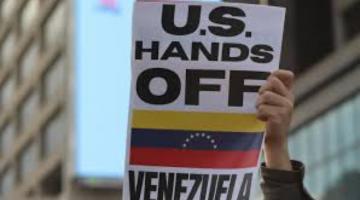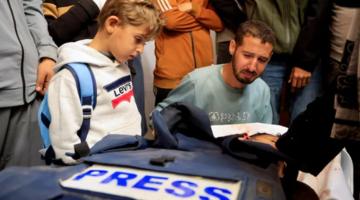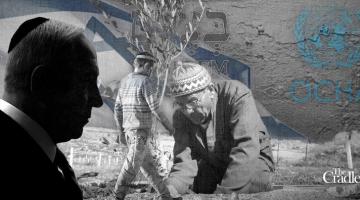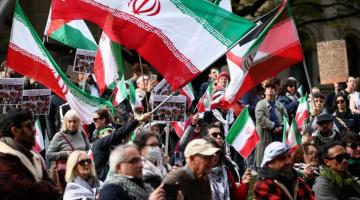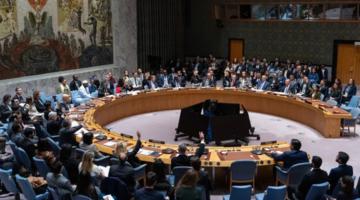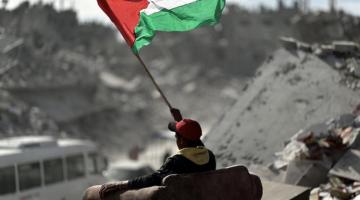A portrait of Hizballah leader Hasan Nasrallah seen in Beirut on 21 September. The leader of the Lebanese resistance group was assassinated by Israel in a massive airstrike on Beirut’s southern suburb on Friday, 27 September. OLA NEWS/SIPA/Newscom
Israel's recent assassination of Hasan Nasrallah came as part of a terroristic campaign it unleashed on Lebanon, culminating in the bombings that leveled whole city blocks. Shock and awe has been Israel's strategy since the beginning of the genocide, but that is not enough to put down the resistance and their fight to liberate the region from the clutches of Zionism.
Originally published in Electronic Intifada.
Israel’s assassination of Hasan Nasrallah, the secretary general of Hizballah, in an apocalyptic bombing attack on Beirut’s southern suburb on Friday is likely, at least in the short term, to cause enormous shock, despair and demoralization among supporters of the resistance to Zionism in Lebanon and across the region.
That is exactly what it is intended to do.
Confirmed by Hizballah on Saturday, Nasrallah’s killing comes after a series of tactical successes in the early stages of Israel’s unfolding full-scale attack on Lebanon, an open-ended assault that may well equal in barbarity Tel Aviv’s ongoing genocide in Gaza.
These are terrible and difficult thoughts to absorb after almost a year of genocide.
First there were the pager and walkie-talkie attacks, followed by a series of assassinations of Hizballah’s senior leaders, and now the head of the organization itself.
As Nasrallah himself admitted in his final speech, the organization suffered a severe blow with the pager attacks. Even worse was to come. Clearly there were serious breaches in security.
Nasrallah’s stature as a tactical and strategic thinker, as the most prominent and trusted leader of the Axis of Resistance, and as a personality capable of inspiring and reassuring supporters even in the worst of times, cannot be overstated.
The euphoria in Israel, Washington and some Arab capitals, will be exceeded only by the grief of Nasrallah’s supporters, who are far more numerous.
And there is no doubt that the loss is real and great from the perspective of a resistance that faces not only Israel’s formidable arsenal, but all the resources of the United States and the collective West.
Israel’s ability to carry out this series of attacks in quick succession will shake the confidence of many in Hizballah’s legendary prowess and operational security.
The attacks will go some way to restoring the prestige Tel Aviv has lost among its Western and Arab backers after a year of military failure in Gaza, and its failure to prevent the Hamas military offensive that wiped out the Gaza division of Israel’s army on 7 October 2023.
And although Hizballah has been hammering Israeli military assets and settlements in the north of historic Palestine with rockets, many in the region are asking why the resistance group’s response to Israel’s escalating aggression has not been harder and harsher – even as Israel intensifies its bombardment of civilians across Lebanon and within its capital.
Another question on many lips is why Iran, which vowed retaliation after Israel’s murder of Hamas leader Ismail Haniyeh in Tehran in July, has acted with such restraint. There is a growing perception that its lack of response only encouraged Israel’s ever more brazen violence.
“Shock and awe” is not victory
Amid the rapidly changing situation and the torrent of emotions after a year of livestreamed genocide in Gaza, now being extended by Israel to Lebanon, it is hard to maintain a long view. But doing so is essential for sound analysis.
It is worth remembering this: In almost any asymmetrical war, when the strongest side – the invader or colonizer – goes on the offensive, it often appears to achieve quick and stunning success.
Indeed “shock and awe” is the name of a Western, specifically American, military doctrine, developed in the 1990s and explicitly touted when the US invaded Iraq in 2003.
Also called “rapid dominance,” its aim is to demoralize and paralyze the adversary with the use of overwhelming and spectacular displays of violence.
The goal according to the doctrine’s authors, is to so “overload an adversary’s perceptions and understanding of events that the enemy would be incapable of resistance at the tactical and strategic levels.”
We’ve seen this time and again in recent decades and we’re witnessing it now.
Just weeks after the 11 September 2001 attacks, the United States attacked Afghanistan, quickly toppling the Taliban government under the pretext that it had sheltered Osama bin Laden.
American confidence following this swift apparent success undoubtedly spurred Washington to go on to its next project: the March 2003 invasion of Iraq.
With the government of Saddam Hussein quickly overthrown and American tanks in control of Baghdad, President George W. Bush gave his infamous “Mission Accomplished” speech on 1 May of that year – words that came to haunt him as the United States became bogged down in a war of attrition against resistance in both Afghanistan and Iraq.
These rapid victories, or so they appeared, sparked real fears at the time that the American forces would roll onwards towards Damascus and Tehran, or perhaps other “rogue states” on America’s hit list.
We know now, from the so-called Afghanistan Papers, that the warmongers in Washington recognized all along that they had lost the war, but lied to the American public for almost two decades that they were winning.
And when the American withdrawal from Afghanistan came in August 2021, the humiliating departure from Kabul airport was widely compared to the chaotic scenes of the defeated Americans evacuating in helicopters from the roof of the US embassy in Saigon, Vietnam.
With respect to Israel too, this pattern has been evident. When Israel invaded Lebanon in 1982 – an assault it dubbed “Operation Peace for Galilee” – its forces quickly swept north to Beirut, besieging and occupying an Arab capital for the first time in the Zionist settler state’s history.
Israel murdered tens of thousands of Lebanese and Palestinian civilians and expelled the Palestine Liberation Organization. But success, from Tel Aviv’s perspective, quickly turned to failure.
During a long occupation, resistance to Israel grew, especially from Hizballah, which did not even exist at the time of the Israeli invasion.
Hizballah and other resistance groups bled Israeli occupation forces for two decades in a grueling war of attrition, until Israel withdrew from occupied southern Lebanon in defeat in May 2000.
Even in the context of the American-backed Israeli genocide in Gaza, Israel’s constant professions that it has placed this or that part of Gaza under its total control, quickly crumble. The fact is that the resistance continues to fight in every part of Gaza.
So far every Israeli-American “day after” plan, in which a defeated Hamas would be replaced by an Arab-backed Palestinian collaborator force, has collapsed.
Distracting from an exhausted Israel’s ongoing failure in Gaza, is perhaps one of the factors spurring Israel to seek spectacular “success” in Lebanon.
Turning point
This sobering moment is a turning point in the long regional war for liberation from racist, Western-backed settler-colonial Zionism. But after a century of Zionism’s depredations and horrors, neither the people of Lebanon nor Palestine have surrendered, and there’s no reason to believe they will now.
On the contrary, after the initial shock, the determination of the resistance will only increase, and its circle will expand, as it has in every phase of the liberation struggle.
Nor does the assassination of Nasrallah, with American bombs and American warplanes, and perhaps other assistance from Washington, change the trajectory of the downward decline of US global power – the power on which Israel relies for its survival.
Let’s recall too that the Zionists have always used assassination as a primary tactic. However, their war is not against individual leaders, but against entire peoples whose determination cannot be so easily snuffed out.
Nasrallah himself assumed the leadership of Hizballah after Israel murdered his predecessor Abbas al-Musawi in 1992. Nasrallah grew the organization to unprecedented strength.
That strength is not based on the will of one individual, but on a base of support deeply committed to the cause and willing – as Nasrallah himself never failed to point out – to make enormous sacrifices on the road to liberation.
If the Israeli army has admitted Hamas cannot be destroyed because “Hamas is an idea, Hamas is a party,” then what about Hizballah?
What is most sobering is that the war to liberate Palestine and the region from Zionism will be no less brutal on the people of the region than the wars to liberate Algeria, Vietnam, South Africa and so many other places targeted by the Euro-American empire.
After all, the occupiers and colonizers are the same countries, and the genocidal hatred their ruling classes bear towards the people whose land and rights they seek to usurp has never dimmed.
Like others before him, Nasrallah gave his life on the road to liberate Palestine, and that struggle did not end today.
Ali Abunimah is executive director of The Electronic Intifada.


